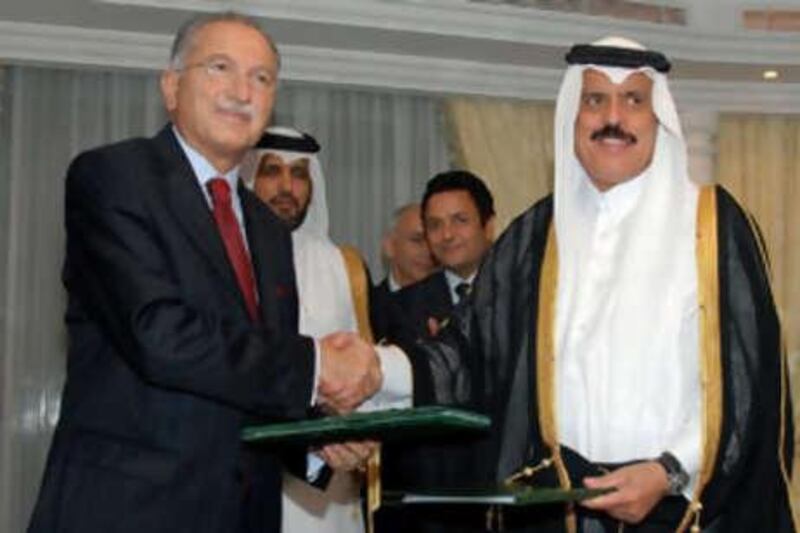UNITED NATIONS // The head of the Organisation of the Islamic Conference has called on Gulf countries and Iran to improve relations and expressed a willingness to mediate between the UAE and Iran over the disputed island of Abu Musa. Speaking at the start of the UN's annual meeting in New York, Ekmeleddin Ihsanoglu, secretary general of the OIC, warned of concern within his organisation over "some tensions" developing across the Gulf.
Prof Ihsanoglu was referring to Iran's controversial decision to erect two marine offices on Abu Musa among a series of hostile incidents that have heightened regional anxieties. "We are aware about some tensions between some members of the Gulf, but I think this would be solved in good faith between neighbouring countries," Prof Ihsanoglu said in an interview. "We feel that the Gulf could be a place of peaceful coexistence between those on both sides ? the Iranian side or the Arabian side. The history of the Gulf has been always one of peaceful coexistence."
The long-standing dispute over Abu Musa and two nearby islands, Greater Tunb and Lesser Tunb, regained diplomatic prominence last month with the announcement of Iranian plans to build offices on the territory. The UAE complained to the UN Security Council that this breached a 1971 agreement between the two governments, although UAE claims were soon rebuffed by an Iranian letter that asserted sovereignty over the island.
Last week, the Arab Interim Parliament called on Iran to begin direct negotiations with the UAE to peacefully resolve the "dispute" over the occupation of Abu Musa and other islands, and asked Arab countries to "exert more pressure on Iran to stop its occupation". Speaking on the sidelines of the General Assembly yesterday, Prof Ihsanoglu said he was willing to step in and offer his organisation's influence to support mediation efforts between the two countries.
"We support good neighbourly relations between them, and if it needs to have any role of the OIC, we would be ready to respond positively to that, given that all the members of the Gulf are members of the OIC," he said. Tensions across the Gulf have been heightened by the islands dispute and a series of other incidents. Tehran accused UAE airport officials of "creating unusual problems for Iranians" and also ordered a journalist from Dubai-based Al Arabiya TV channel to leave the Islamic republic.
Sheikh Abdullah bin Zayed, the UAE's Minister of Foreign Affairs, is expected to assert claims for sovereignty of the islands during his speech before the UN's General Assembly on Saturday morning. The Iranian president, Mahmoud Ahmadinejad, is due to address the assembly this afternoon, but Iran has typically avoided publicising the islands issue. Iran's involvement in the meeting in New York is likely to be dominated by its bid to gain a temporary seat on the Security Council as well as its nuclear programme which it claims is for peaceful purposes, but the West suspects is to create a nuclear weapon.
Western countries are seeking this week to impose more sanctions against the Islamic republic, particularly after last week's International Atomic Energy Agency report that said Iranian stonewalling had undermined investigations. The dispute over Abu Musa and the two other islands dates back to 1971 when the United Kingdom withdrew from the region and the three islands were occupied by Iran. The UAE claims sovereignty over the islands on the grounds that they belonged to Ras al Khaimah and Sharjah, while Tehran offers competing claims on historical grounds.
While in New York, Prof Ihsanoglu said he would be urging leaders of the international community to avert the prosecution of Sudan's longtime president, Omar al Bashir, on charges of genocide in Darfur. The prosecutor of the International Criminal Court has asked judges to issue an arrest warrant for Mr Bashir on allegations relating to the deaths of up to 300,000 people since fighting erupted between government-backed janjaweed militia and rebels in early 2003.
The court is expected to make its decision before the end of the year and the Sudanese government has been lobbying African and Arab countries to support its attempts to evade Mr Bashir's prosecution. Prof Ihsanoglu warned that the prosecution could lead to greater political instability in Sudan and highlighted the potential dangers of issuing an arrest warrant against a seated head of state. "We have to be a little bit more prudent before we proceed more in this direction and I sense that this is the emerging consensus by different international organisations," Prof Ihsanoglu said.
"We have to give a chance to more negotiation, to the Sudanese government to take more actions in the right direction before we head to a point which we might regret or cannot retreat from." @Email:jreinl@thenational.ae







